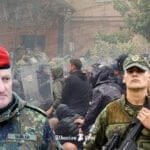Despite a turbulent year for the civil society and the citizens of Kosovo, the position of this country on the road to democratization has remained the same as last year, it was said in the latest report of the international organization, Freedom House, on the level of democracy in some regions of Europe and Asia.
The problems with Serbia have been mentioned as among the key obstacles in Kosovo’s way forward.
In the assessment for the year 2023, from 1 to 7 points, where 1 represents the lowest level of democratic progress and 7 the highest, Kosovo continues to have 3.29 points.
As for the countries of the region, Albania and Croatia have also not changed their position, while North Macedonia, Montenegro, Serbia and Bosnia-Herzegovina have marked a decline on the road to democratization.
Apart from Croatia, other Balkan countries are on the list of countries with a hybrid regime of government, according to the evaluations of Freedom House, the organization based in Washington.
However, Kosovo is mentioned as a country with a hybrid regime directed towards democracy, Serbia towards autocracy, while Albania, North Macedonia, Montenegro and Bosnia-Herzegovina are mixed on both sides.
Protests in the north, the incident in Banjska, Kosovo-Serbia relations
In the section on Kosovo, the report mentions that in 2023, disagreements with Serbia have entered a new phase of escalating tensions.
“Kosovo Serb protesters clashed and injured 30 NATO troops in May, and armed Serbs carried out an attack in September that killed four people, including a police officer,” the report said.
The assessment was a reference to the May protests in the three municipalities in the north of Kosovo – Zveçan, Leposaviq and Zubin Potok – as a sign of opposition to the entry of the new Albanian mayors into the municipal buildings, as well as to the September attack in Banjska in Zveçan, in which which Sergeant Afrim Bunjaku was killed and in the exchange of fire also three Serbian attackers.
The responsibility for the attack was taken by the former vice-president of Lista Serbe – the largest party of Serbs in Kosovo – Millan Radoicic, who is believed to be now in Serbia, and for whom there is an international arrest warrant issued by the International Police Agency (INTERPOL).
Kosovo has blamed the state of Serbia for organizing and carrying out the attack, but the official Belgrade constantly rejects the accusations.
“In many countries, but especially in those of the Western Balkans, political leaders are using the greater focus on regional security as a justification to subvert democratic institutions and avoid democratic norms.”
The report also mentions that the current Government in Kosovo, which began its leadership in 2021, “has tried to remove the country from the legacy of the parliamentary conflict, promoting a reform agenda based on the rule of law”.
“Prime Minister Albin Kurti has initiated a new vetting process for judges. However, Serbia’s refusal to recognize Kosovo’s independence continues to be a major barrier to democratization. Despite the agreements reached between the two governments at the beginning of 2023, the year has been followed by instability and escalation of violence, fueled in part by Belgrade’s unofficial connections with organized criminal groups.
In February 2023, Kosovo and Serbia reached an agreement with the aim of normalizing relations, while in March for an implementation annex.
However, the parties have not signed the agreements and have done little to implement them.
The Freedom House report also mentioned the reaction of Kosovo’s international partners to “Kurti’s harsh approach in the negotiations with Belgrade, and the lack of consultation with the Kosovo Serb community”, which, according to the report, “complicated the efforts of the Government to free itself from this long-term challenge”.
Serbia marks the ‘greatest decline’
In the report for 2023, Freedom House said that Ukraine has made the biggest progress in the democratization process, while Serbia has made the biggest decline.
From the 3.79 points it had the previous year, Serbia has now been evaluated with 3.61 points.
The fall, as it has been said, historic, has been attributed to the efforts of the president of Serbia, Aleksandar Vučić, to consolidate power.
“The mass shooting in May sparked protests throughout the summer, to which the Serbian government responded with rigged early elections in December.
Moreover, Vučić’s leadership has been described as one that has maintained power through manipulated election processes, with dominance in public and private media, through the smearing of opposition members and activists, as well as intimidation of municipal leaders.
Other countries of the region
Freedom House notes that in 2023, North Macedonia faces a major setback in the area of rule of law, as the parties have had strong disagreements over constitutional amendments, which are necessary to avoid Bulgaria’s veto on the way to Skopje. towards European integrations.
Montenegro is said to be still picking up its pieces after the 2022 constitutional crisis, and has faced dysfunctional and corrupt municipal governance in the absence of stability at the national level.
As for Bosnia-Herzegovina, Freedom House has estimated that the assessment of defamation as a criminal offense in the Republika Srpska since July of last year has increased the pressure on journalists, in an environment that has already been on a downward trend, in terms of hate speech and physical security.
Overall, Freedom House has said that of the 29 countries analyzed from Central Europe to Central Asia, 10 have recorded decline, while only five have recorded progress.
The international organization evaluates the level of democratization of the countries of this region since 1995 and categorizes each country based on the type of regime.
For the 20th year in a row, Freedom House has registered a decline in the level of democratization in the region it observes.
Russia’s war in Ukraine – launched in February 2022 – and the Azerbaijani regime’s invasion of the Nagorno-Karabakh region are said to have precipitated a new geopolitical order.
“The fate of European democracy now largely depends on the willingness of democratic states to adopt a more active approach to security in the region, especially by supporting Ukraine,” said Mike Smeltzer, co-author of the report and senior researcher for Europe and Eurasia.
“Any failure to uphold democracy during this critical moment will make it more costly to control the expansion of authoritarian regimes in the future, both in the region and in the world. The United States and Europe must act now to guarantee Moscow’s defeat during the invasion of Ukraine, to protect democratic institutions and norms,” he said.
The war in Ukraine started on February 24, 2022.
Russian President Vladimir Putin calls the war a “special military operation” to demilitarize Ukraine
The West has responded to Russia, hitting the economy of this country with harsh sanctions.
As a result of the war, thousands of people have died and millions more have been displaced from their homes. /REL/







